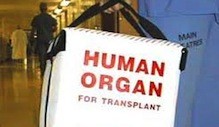 Giving a kidney can be one of the greatest gifts one can offer to another person.
Giving a kidney can be one of the greatest gifts one can offer to another person.
The first successful human kidney allograft was carried out between the identical Herrick twins in Boston in 1954, Ronald giving a kidney to Richard and in so doing becoming the world’s first living organ donor. Richard lived another eight years, and Ronald died in 2010.
Today, an increasing number of living, related transplants are taking place. Lobes of the liver or lung have been transplanted and a very particular example is the ‘domino’ procedure in heart-lung/heart transplantation. Here the heart and lungs from a donor are transplanted into a recipient with a healthy heart but diseased lungs (technically easier than just transplanting the lungs). The ‘good’ heart from the recipient is then transplanted to another patient with a diseased heart.
The majority of living donors give a kidney, usually between family members or, if the blood groups are incompatible, there can be multiple groups where family A donates to family B who donates to family C who donates to family A – or even though a much larger chain. There is now at least one Christian organization that is promoting altruistic donation, encouraging the gift of a kidney to people that are unrelated and unknown to the donor.
It has been said that you cannot tell others how to spend their money or how to bring up their children, and I would add you cannot tell someone else whether or not they should donate a kidney, be it to a family member or an unrelated person.
The Bible does not say a lot about transplantation, although the Old Testament has a great deal to say about the moral responsibilities of the individual, and the controlling theme throughout the New Testament is that the Christian has to be Christ-like in his attitude and behaviour. Jesus is the model and example for the Christian. He left the glory of heaven because of his great love for us which led him to the cross. His command is for us to love one another as he has loved us.
However, while donating a kidney may be a hugely beneficial gift to a person on dialysis where the life expectancy and quality of life are reduced, one should be exceptionally careful of undue pressure on a potential donor. This is especially the case where pressure may come from people who suggest that it is Christlike (which it undoubtedly is) to give in this way. Like marriage, kidney donation should not be entered into unadvisedly or lightly; but reverently, discreetly, advisedly, soberly, and in the fear of God.
The surgery to remove a kidney in a healthy person is safe but not entirely without risk, having a mortality rate of one in 3,000. It should never be described as routine. No operation is routine; it is either an elective or an emergency operation. Those of us in the surgical field are well aware that sometimes operations – even the most straightforward ones – go wrong, and many years ago I came near to a disaster operating on a living related kidney donor.
That is not to say the one should not embark on a particular procedure, and indeed those who donate a kidney statistically live longer than those who do not. However, that is purely because one will only be allowed to give a kidney after going through a battery of tests. Only once one’s health has been shown to be exceptionally good with no apparent underlying conditions will a donation go ahead.
Living, unrelated donor transplantation is more complicated than a related donation. Strictly speaking, spouses fall into this category as they are not blood-related, and the tissue match is unlikely to be as close as a blood relative even if the blood group is the same. One should also be aware of the emotional turmoil which may accompany living related donation. This may include the guilt of the recipient in putting the donor through a major operation that they do not need, the feeling of superiority of the donor over the recipient. Most tragically of all, the guilt of the donor should the graft fail, or the guilt of the recipient should the donor suffer major complications or even die from the operation. Careful counselling is crucial to allow these conflicts to be resolved if they occur.
Yet if this donation, whether from a family member, friend or stranger, comes as a free gift without any external pressure and with no financial, moral or emotional incentive, should surely be welcome, and is a tremendous, albeit lesser, reflection of Christ’s love for us.
David Cranston Associate Professor of Surgery, University of Oxford



